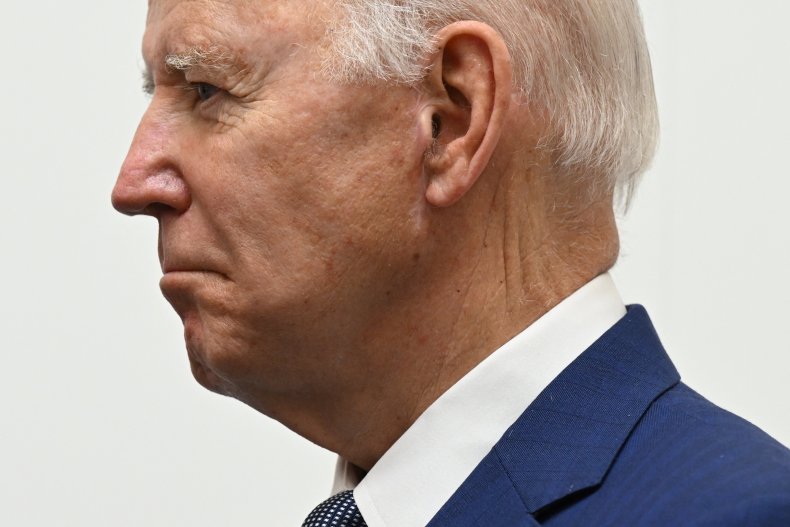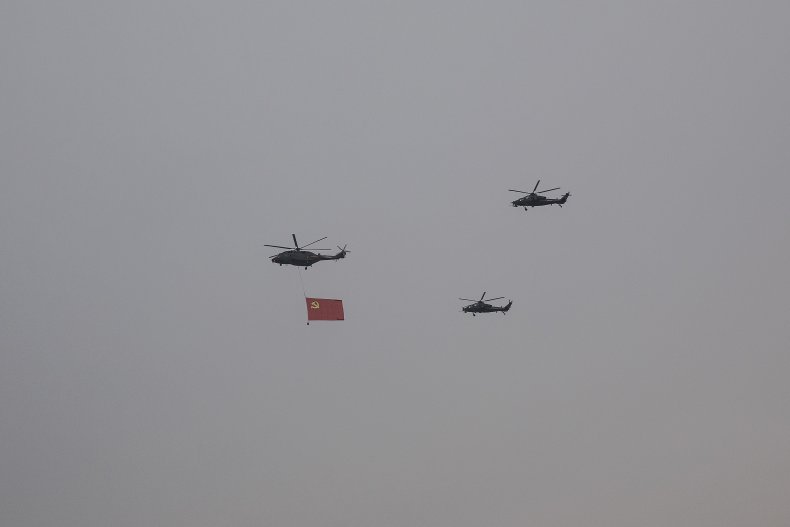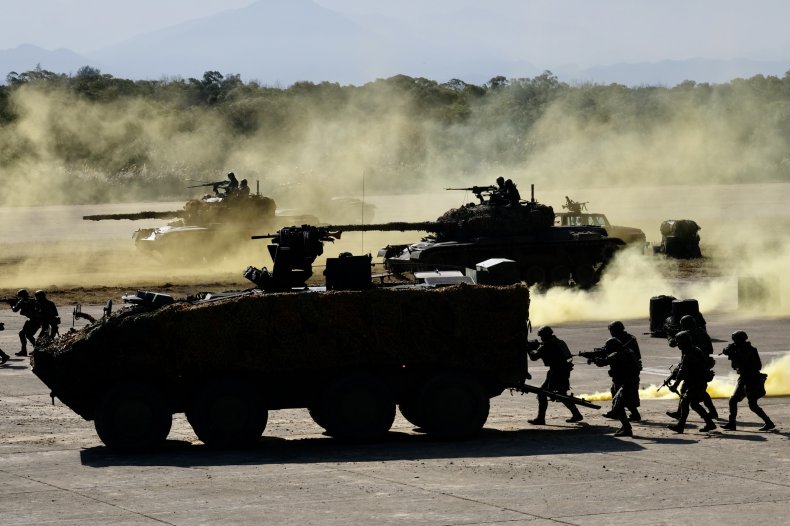JOHN FENG
Alife-size mockup of an American aircraft carrier in a desert in northwest China, captured by commercial satellites late last year, confirmed for many that Beijing was actively preparing for a military engagement with U.S. forces in a future fight over Taiwan.
China, which has maintained a decades-long claim to the island it has never governed, faced off with the United States on the Korean Peninsula and in the Taiwan Strait during the first half of the Cold War.
In the mid-1990s, already over a decade after Washington and Beijing had established formal diplomatic relations, it was the U.S. Navy that deterred the People's Liberation Army from further aggression against Taiwan.
Nearly 30 years later, the balance of power across the strait has shifted significantly; Pentagon officials and their counterparts in Taipei believe China intends to build the capability to finally seize Taiwan, regardless of Washington's intention to intervene in the next Taiwan Strait crisis.
Experts tell Newsweek that a U.S. military reaction to a future Chinese invasion is likely, even though the precise nature of the American response is hard to predict.
Officially, however, Washington has kept its cards close to its chest for more than 40 years, since ending formal diplomatic relations with Taipei in 1979.
 President Joe Biden attends a Quad leaders summit at the Prime Minister’s Office in Tokyo, Japan, on May 24, 2022.SAUL LOEB/AFP VIA GETTY IMAGES
President Joe Biden attends a Quad leaders summit at the Prime Minister’s Office in Tokyo, Japan, on May 24, 2022.SAUL LOEB/AFP VIA GETTY IMAGESThe Impact of the Taiwan Relations Act
That year, President Joe Biden, then still a junior senator for his home state of Delaware, was among those who voted to pass the Taiwan Relations Act, a piece of legislation governing unofficial relations with Taiwan, and once described by a current administration official as among the most significant foreign policy undertakings in the history of Congress.
Among the law's key provisions is a mandate to provide Taipei with defensive arms so as to maintain its self-defense capability against Beijing.
It also requires the U.S. to "maintain our capacity to resist any resort to force or other forms of coercion that would jeopardize the security or the social or economic system of Taiwan," Secretary of State Antony Blinken reminded the public last week.
Crucially, the TRA doesn't include a concrete security guarantee that would obligate a U.S. military response to a Chinese attack against the island, despite past experiences suggesting otherwise.
Given the close ties between Washington and Taipei—Taiwan is the U.S.'s eighth-largest trading partner—analysts believed a Taiwan crisis might see rapid American arms transfers at the very least.
However, Biden himself, and some of his senior officials, have been the ones suggesting the U.S. could do more, especially since the outbreak of war in Ukraine.
 Helicopters of the People's Liberation Army Air Force fly in formation during a parade to celebrate the centennial of the Chinese Communist Party in Beijing, China, on July 1,
Helicopters of the People's Liberation Army Air Force fly in formation during a parade to celebrate the centennial of the Chinese Communist Party in Beijing, China, on July 1, Assessing China's Aims and Ambitions
Since Russia's invasion began in February, lawmakers on Capitol Hill have been asking for the administration's assessment of when China might do the same.
The answer across government departments has been consistent: Beijing wants to be able to take Taiwan by the end of the decade—over U.S. intervention, according to Director of National Intelligence Avril Haines.
Ely Ratner, the Pentagon's assistant secretary of defense for Indo-Pacific security affairs, told a House committee hearing in March that the U.S. response in such a scenario would differ from how it's supporting Ukraine. "I'm confident that some of our closest partners would be with us in a Taiwan contingency," he said.
Last week, while standing beside Prime Minister Fumio Kishida of Japan at a press conference in Tokyo, Biden said the U.S. would become military involved in the event of a Chinese invasion, even though he believed such a move "will not happen" and "will not be attempted."
Although Biden later disagreed, his remarks appeared to break with over four decades of careful dancing around the question, a deliberate position known as "strategic ambiguity," in which the U.S. doesn't publicly commit or dismiss the possibility of defending Taiwan militarily.
The End of Ambiguity?
Taiwan, meanwhile, says it would be ready to fight alone, although it has asked the U.S. to expedite arms sales as PLA capabilities continue to grow.
While some may argue otherwise, subject matter experts believe China already assumed America would intervene, long before the president's apparent slip of the tongue.
"For Beijing, Biden's remarks may reveal the attitude to the current 'answer' to U.S. strategic ambiguity," says Hung Tzu-chieh, an assistant research fellow at the Institute for National Defense and Security Research, Taiwan's top military think tank. "I don't think Biden's remarks will change Beijing's strategic thinking, as Beijing has long considered the possibility of U.S. military intervention."
"For example, China has continued to develop its naval power and anti-access/area denial (A2/AD) capabilities in the Western Pacific over the past decades. Its purpose is mainly to target the U.S. military," Hung says.
The PLA's rapidly developing long-range strike capabilities—both conventional and nuclear—are unlikely to be used on Taiwan either, their range already capable of reaching Guam.

No comments:
Post a Comment